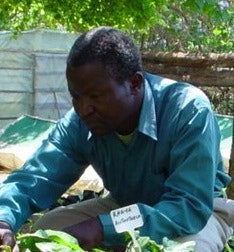Conservation and sustainable use of endangered native socio-economic plants in Thyolo Mountain Forest Reserve, Malawi
Thyolo Mountain Forest Reserve in Southern Malawi is rich in biodiversity. Its floral wealth is important to local communities who use native plant species for traditional medicine, firewood, timber and poles. However, indiscriminate harvesting of many plants without due respect for regeneration has made many medicinal species critically endangered.
Encroachment of the reserve for agricultural expansion has exacerbated the situation, resulting in local disappearance of the most valuable tree species and gradual retreat of the forest to the detriment of both people and wildlife.

Raphael Kondwani is senior conservation officer at the Malawian NGO Friends of Nature (NoF) and is leading a team to raise awareness of the negative impacts of forest degradation among local people and show them how to reduce it.
An ethnobotanical survey carried out in 2005 by FoN and the Forestry Research Institute of Malawi (FRIM) in and around Thyolo Mountain Forest Reserve confirmed severe pressure on the reserve and the decline of many important medicinal plants due to over-exploitation and destructive harvesting methods. It was also observed that loss of these plant species has correspondingly led to the decline of animal and insect populations which depend on them for food and shelter, as well as the drying up of some perennial forest rivers.
The project aims to build conservation capacity at a local level through workshops on the sustainable harvesting of socio-economic plant species, to actively include locals living around the reserve in reducing pressure on the forest.
Through education outreach, posters, pamphlets and radio, awareness will be raised to help locals fully understand the importance of the reserve to their everyday lives, the consequences associated with over-exploitation, and the need to conserve forest for clean water, air and materials. As part of the project, local stakeholders and school children are being encouraged to form natural resource management committees (NRMCs) and clubs to take an active role in protecting their forest from would-be poachers.





